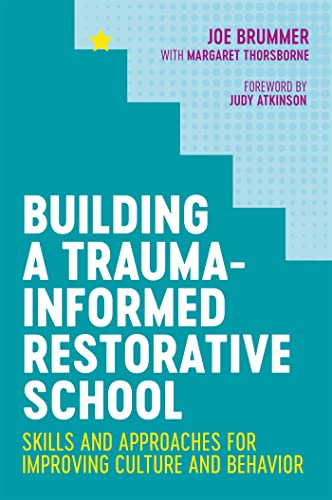Building a Trauma-Informed Restorative School
Skills and Approaches for Improving Culture and Behavior
Joe Brummer
BOOK REVIEW

In the chaotic world of education, where children often bear the weight of unprocessed trauma, Building a Trauma-Informed Restorative School: Skills and Approaches for Improving Culture and Behavior by Joe Brummer emerges as a lighthouse guiding educators and administrators through stormy seas. This compelling work doesn't just brush the surface of behavioral issues; it delves deep into the emotional undercurrents shaping the school environment, offering a transformative approach that could redefine how we nurture young minds.
Brummer, an experienced educator and advocate for restorative practices, writes with the urgency of someone who understands the profound impact trauma has on learning. His insights articulate a pressing need for schools to abandon outdated punitive measures that exacerbate rather than alleviate behavioral issues. Instead, he champions a framework rooted in compassion, acknowledging that students-not just as learners, but as individuals with complex emotional lives-deserve a nurturing atmosphere that recognizes their struggles.
At the heart of Brummer's argument is a call to action: educators must cultivate an environment that prioritizes trauma-informed and restorative practices. 🌱 This isn't merely a suggestion; it's a necessity. The traditional school climate often reflects societal injustices, reinforcing students' feelings of alienation and despair. By implementing trauma-informed approaches, schools can begin to dismantle these barriers, fostering inclusivity and understanding.
Readers are left with a sense of urgency. It's not just about improving behavior or academic performance; it's about healing and growth. Brummer provides practical skills and strategies to educators that can seamlessly integrate into their daily routines. From understanding the signs of trauma to creating inclusive spaces that promote healing, the book serves as a roadmap for transformation. Furthermore, Brummer's discussion on the importance of restorative practices is especially poignant. He emphasizes that conflict is inevitable, but resolution can foster growth rather than acrimony.
As you turn the pages, you feel the weight of stories from educators who have witnessed the devastating consequences of neglecting students' emotional needs. Their reflections are a call to arms: a reminder that the current system often fails the very individuals it's meant to protect. 🛡 Reader comments echo this sentiment, with many expressing a newfound awareness of the fundamental changes needed in educational policies. Opinions range from admiration for Brummer's vision of an ideal school environment to critiques about the feasibility of implementing such sweeping changes, especially in underfunded institutions.
In these discussions, the essence of Brummer's work is laid bare: real change is hard, and it often thrives in the face of adversity. Schools, often resistant to change, must grapple with the societal pressures and the administrative inertia that stifles innovation. Brummer's insights challenge us to rethink our approach to education-not as a rigid institution, but as a dynamic community where each child's experience is valid and worthy of consideration.
The historical context in which Brummer presents his ideas is crucial. The book emerges during a time of burgeoning awareness surrounding mental health and the social-emotional aspects of education. The rhetoric of "restorative justice" has gained traction, yet many educational institutions still hesitate on the brink of transformation. The pandemic has laid bare the vulnerabilities of our students, making it even more essential for educators to adopt a compassionate and restorative lens.
What's most inspiring about Building a Trauma-Informed Restorative School is its potential ripple effect. By equipping educators with practical tools, Brummer doesn't just advocate for change; he ignites a movement. 🌟 The skills he outlines can not only enhance school culture but empower students to assume active roles in their own learning and healing processes. His work has already begun to influence thought leaders in education, clinical psychology, and policy-making, embodying a profound commitment to redefining our educational landscape.
Ultimately, this book isn't just an instructive manual; it's a clarion call for empathy, understanding, and actionable change. Through Joe Brummer's penetrating insights, we find ourselves regarding our role as educators with renewed fervor-a reminder that the souls of our students are interwoven with their stories, their struggles, and ultimately, their triumphs. Are you ready to join this transformative journey in education? If the answer is yes, then this book is not just a recommendation; it's essential reading! 🚀
📖 Building a Trauma-Informed Restorative School: Skills and Approaches for Improving Culture and Behavior
✍ by Joe Brummer
🧾 240 pages
2020
#building #trauma #informed #restorative #school #skills #approaches #improving #culture #behavior #brummer #JoeBrummer